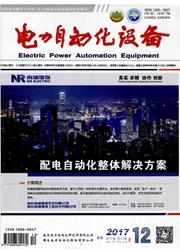

 中文摘要:
中文摘要:
大规模可再生能源的并网以及电力市场解除管制的改革,使传统集中式的节点电压在线安全分析、调度与控制方法面临困境。对此,在电网运行状况全景过程化可观测条件下,提出了渐进学习的电网节点聚合的新调控理论,通过电网"局部自治与集中调控互融"的调控方式解决电网的调控问题。提出了基于Q型因子学习的电网节点聚合规律的挖掘方法,根据传统节点电压方程及发电机、负荷的等值模型得到广域环境下节点电压向量与电势之间的解析关系,推导出连续2个量测时刻下节点电压幅值变化的影响因子,并对其进行过程化的Q型因子学习,进而得到电压幅值具有一致变化的节点聚合规律。通过对德州电网的仿真分析,验证了所提方法的准确性及有效性。
 英文摘要:
英文摘要:
As the grid-connection of large-scale renewable energy and the reform of deregulated electricity market make the centralized online node-voltage security analysis,dispatch and control even difficult,a regulation theory of node aggregation based on the progressive learning in the condition of panoramic process observability for power system operation is proposed,which adopts the power grid dispatch mode of"interacted local autonomy and central control". A method based on Q-factor learning is proposed to mine the law of node aggregation,which,based on the traditional node voltage equation and the equivalent models of generator and load,obtains the analytical relationship between the node voltage phasor and the electric potential in the wide-area environment,deduces the influencing factor of voltage magnitude variation during two successive measurements,and achieves the aggregation law of nodes with same direction of voltage magnitude variation through the process of Q-factor learning. The simulative analysis for Dezhou Grid verifies the correctness and effectiveness of the proposed method.
 同期刊论文项目
同期刊论文项目
 同项目期刊论文
同项目期刊论文
 Calculation of Power Transfer Limit Considering Electro-Thermal Coupling of Overhead Transmission Li
Calculation of Power Transfer Limit Considering Electro-Thermal Coupling of Overhead Transmission Li 期刊信息
期刊信息
